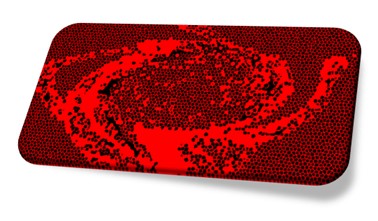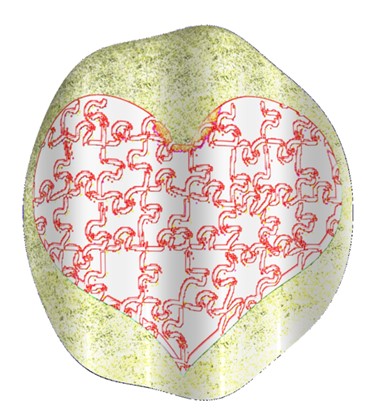Antihypertensive Medications
HFpEF Articles Series
Conversation With ChatGPT4 October 2023

Heart Blood Management Abstract Artwork
F McCullough Copyright 2023 ©
Antihypertensive Medications
Antihypertensive medications are drugs specifically designed to treat high blood pressure, also known as hypertension. High blood pressure is a condition where the force of blood against the arterial walls is consistently too high, potentially leading to various complications such as stroke, heart failure, and kidney disease among others.
Types Antihypertensive Medications
There are several classes of antihypertensive medications, each working in a different way to control blood pressure:
Diuretics: Also known as "water pills," they help the kidneys expel excess sodium and water from the body, thereby reducing blood volume and pressure.
Beta Blockers: These medications reduce the workload on the heart by limiting the rate and force of heart contractions.
Calcium Channel Blockers: These drugs relax the muscles of the blood vessels, making them wider and thereby lowering blood pressure.
ACE Inhibitors: Angiotensin-converting enzyme inhibitors block the production of angiotensin II, a hormone that narrows blood vessels, thereby helping the vessels relax and lower blood pressure.
Angiotensin II Receptor Blockers (ARBs): Similar to ACE inhibitors, these medications block the action rather than the production of angiotensin II.
Alpha Blockers: These medications reduce nerve impulses to blood vessels, allowing blood to pass more easily, reducing pressure.
Side Effects
Common side effects of antihypertensive medications can include dizziness, fatigue, and frequent urination, among others. Some antihypertensives also have the potential to interact with other medications, so a thorough medication review is essential.
Role Of Artificial Intelligence
AI could play a significant role in personalised medicine, particularly in optimising antihypertensive treatment. For instance, machine learning algorithms could analyse a patientís medical history, lifestyle factors, and genetic makeup to predict how well they might respond to different types of antihypertensive medications. This could enable healthcare providers to select the most effective treatment with the fewest side effects, improving patient outcomes.
As always, antihypertensive medications should be prescribed and managed by a qualified healthcare provider, particularly in patients with multiple underlying conditions.
Conversation with Open AIís ChatGPT and Edited by F McCullough, Copyright 2023 ©
Disclaimer
Disclaimer: The information provided on this webpage is sourced from Chat GPT, an AI language model, and is intended for informational purposes only. While effort has been made to ensure the accuracy and completeness of the information presented, we cannot guarantee its reliability or appropriateness for every individual or situation. The content is not a substitute for professional medical advice, diagnosis, or treatment. We strongly encourage you to consult with a qualified healthcare professional before making any decisions or taking any actions based on the information provided here. We disclaim any liability for any consequences that may arise from the use or misuse of the information on this webpage.
Heart Failure With Ejection Fraction Index
Article Titles:
Anaemia
& Heart Failure With Preserved Ejection Fraction
Asthma
& Heart Failure With Preserved Ejection Fraction
Dizziness& Heart Failure With Preserved Ejection Fraction
Genetic Factors & Heart Failure With Preserved Ejection Fraction
Heart Failure With Preserved Ejection Fraction Terms Explained
Hypoxia & Heart Failure With Preserved Ejection Fraction
Intensive
Therapy Unit (ITU) Syndrome, Asthma, & HFpEF
Muscle Pain & Heart Failure With Preserved Ejection Fraction
Protein & Heart Failure With Preserved Ejection Fraction
Questions to Ask Your Doctor About Heart Failure With Ejection Fraction
Root Causes For Heart Failure With Preserved Ejection Fraction
Artwork

Beating Heart Abstract Artwork
F McCullough Copyright 2023 ©
Links
Agriculture
Articles
Ecology
Finance
Genomics
Goats
Health
History
Leadership
Medicine
Museums
Photographs & Art Works
Artworks, Design & Photographs Index
Other Photographs & Art Works By F McCullough
Places To Visit
Other Museums And Places To Visit
Plants
Poetry
Research
Science & Space
Science & Space Articles & Conversations
Songs
Technology
Links
Information
Image Citations
- Heart Blood Management Abstract Artwork F McCullough Copyright 2023 ©
- Beating Heart Abstract Artwork F McCullough Copyright 2023 ©
Table Of Contents
Types
Antihypertensive Medications
Role Of
Artificial Intelligence
Heart Failure
With Ejection Fraction Index
Copyright
Keywords: Antihypertensive Medications,
High Blood Pressure, Hypertension, Blood, Arterial, Walls High, Stroke, Heart
Failure, Kidney Disease, Types, Blood Pressure, Diuretics, Water Pills,
Kidneys, Sodium, Water, Body, Blood Volume, Pressure, Beta Blockers, Heart,
Heart Contractions, Calcium Channel Blockers, Muscles, Blood Vessels, Lower
Blood Pressure, ACE Inhibitors, Angiotensin-Converting Enzyme, Inhibitors,
Block, Production Of Angiotensin II, Hormone, Narrows Blood Vessels, Relax,
Angiotensin II Receptor Blockers, ARBs, Medications, Alpha Blockers, Nerve
Impulses, Reduce Blood Pressure, Side Effects, Dizziness, Fatigue, Urination,
Interact, Medication Review, Artificial Intelligence, AI, Personalised
Medicine, Optimising Antihypertensive Treatment, Medical History, Lifestyle Factors,
Genetic Makeup, Healthcare Providers, Effective Treatment, Fewest Side Effects,
Improving Patient Outcomes, Multiple Underlying Conditions,
Hashtags: #AntihypertensiveMedications,
#HighBloodPressure, #Hypertension, #Blood, #ArterialWalls, #High, #Stroke,
#HeartFailure, #KidneyDisease, #Types, #BloodPressure, #Diuretics, #WaterPills,
#Kidneys, #Sodium, #Water, #Body, #BloodVolume, #Pressure, #BetaBlockers,
#Heart, #HeartContractions, #CalciumChannelBlockers, #Muscles, #BloodVessels,
#LowerBloodPressure, #ACEInhibitors, #AngiotensinConvertingEnzyme, #Inhibitors,
#Block, #ProductionAngiotensinII, #Hormone, #NarrowsBloodVessels, #Relax,
#AngiotensinIIReceptorBlockers, #ARBs, #Medications, #AlphaBlocker,
#NerveImpulses, #ReduceBloodPressure, #SideEffects, #Dizziness, #Fatigue,
#Urination, #Interact, #MedicationReview, #ArtificialIntelligence, #AI,
#PersonalisedMedicine, #OptimisingAntihypertensiveTreatment, #MedicalHistory,
#LifestyleFactors, #GeneticMakeup, #HealthcareProviders, #EffectiveTreatment,
#FewestSideEffects, #ImprovingPatientOutcomes, #MultipleUnderlyingConditions,
Created: 13 October 2023
Published: 23 October 2023
Page URL: https://www.mylapshop.com/hfpefantihypertensive.htm
